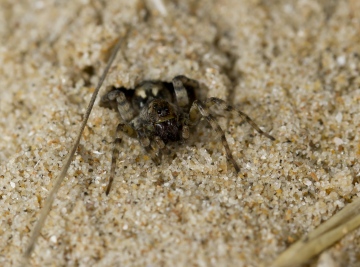Notes on Arctosa perita

From Miscellaneous Notes on Spiders in the Doncaster Museum Arachnid Collections (1) by C.A. Howes
Arctosa perita (Lat) new V.C. 63 record
From The Newsletter No. 9 April 1974
Two males and one female taken by John Burn and C.A.H. 13/10/1973
at Hatfield Lings (S.E. 65-07-) , a system of old sand and gravel pits
recolonised by Calluna, Erica, Pteridium, Ulex and Sarothamnus. Many
occupied tubes were found, the most favoured situations appearing to
be the zone of loose granules at the foot of old, well eroded, sand
embankments and workings. This is a thriving colony and the first inland
population known for Yorkshire - no doubt further searches will reveal
more. The only other records to hand for this most attractive lycosid
are from Spurn, where, like L. purbeckensis it was recorded by Braham
and Murgatroyd in 1953 and Sudd 1972.
Added by John Partridge at 16:00 on Fri 30th Dec 2011.
Part of Notes on the Autecology of Some Sand
Dune Spiders
by James Bell and Alison Haughton
From The Newsletter No. 73 July 1995
Arctosa perita (Latreille, 1799)
showed very strong associations with bare ground and
the sparse vegetation typically found in frontal habitats.
A. perita is considered as a frontal dune specialist by
other authors such as Almquist (1973) and Duffey (1968),
although this species also occurs inland on heathland
(Leighton, 1972), old ironstone workings (Horsfield,
1979), river banks and shores (Foelix, 1982) and old
sand and gravel pits (Howes, 1974). What appears to
characterise all of these habitats is first that the substrate
is granular and loose in nature and secondly that the
vegetation is in the pioneer stages of plant succession
where plant cover is reduced. It seems likely that
A. perita is found in such habitats because it is a
burrowing species which needs to excavate its runnel in
substrates that can easily be moved to form an opening.
Added by John Partridge at 16:14 on Wed 28th Dec 2011.
Return to Summary for Arctosa perita